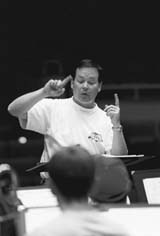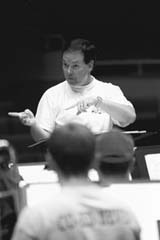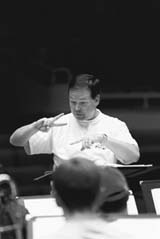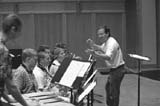

"We try to dig deeper--try to find that one extra note, that one special accent to make it feel better. That makes it more fun for the listeners and the players."




Magazine
Fall 1998
"It Don't Mean a Thing If
It Ain't Got That Swing"
John Hill's mood and movements are lively, with
syncopation -- a perfect match for the Duke Ellington tune his band is playing.
The professional percussionist and director of the Wabash Jazz Band is running
his players through their final rehearsal before Saturday's Homecoming Concert.
With only three practices under its belt, the band is covering a lot of
ground.
So is Hill. One moment he's face to face with the sax players, the next he's admonishing his conga player to "play off of the horns." Then he's racing to the back of Salter Hall, still waving his right arm to the beat, gauging the effectiveness of the "shout chorus" that finishes the Ellington piece with a controlled but explosive crescendo.
"C'mon guys," he urges. "I want to hear it bounce off the back wall."
After three tries, the music does just that, and Hill strides back to the stage, as enthusiastic in his praise as he was adament with his instructions. A minute later the next number with a Bill Clinton joke. The band boos in mock derision. They're loosening up. It's coming together. The chemistry that has made the jazz band a favorite at Wabash concerts and a great success story of the Wabash music program is beginning to gel tonight. Come Saturday's concert, they'll bring the Homecoming audience to its toe-tapping feet.
Wabash Magazine asked the director who has helped to turn the band around to talk to us about the jazz band, his own experiences as a player, and the team aspects he's encountered while leading his own trio and jamming in the only original American music form:
WM: Does jazz lend itself to a team approach in a way that other music doesn't? I noticed you were emphasizing the importance of call and response, of "playing off" each other.
Hill: Call and response is one of the most basic elements in jazz. That's how jazz band started. One person played one thing and an other person echoed it, much like the call and response in farm fields-the work song kind of thing.
There are huge call and response sections in orchestrated jazz band music. You'll hear the saxophone play, then the brass plays it back. Within that, there are even smaller increments. The key is to get the feeling of that smaller increment. Being able to do that makes the difference between a band that sounds okay and one that grooves harder, makes you want to dance. That's what we try to bring out of the printed page. We try to dig deeper-try to find that one extra note, that one special accent to make it feel better. That makes it more fun for the listeners and the players.
The teamwork aspect of this is that you've got to give everybody his space to let the sound of his instrument come through so that it changes the music. It's more fun to hear the thing undulate a little bit so that you're not getting just one sound.
WM: That's what gives the band it's own sound?
Hill: Interpretation is key for us. At the height of the big band era, there were probably 250 or so working bands, and a lot of them had the same charts. Yet they didn't sound the same. That's because the leader has the ability to change the sound. It's like walking into someone's house whose stereo sounds different than yours-it's trebly, or bassy, you adjust that. I have a sound in my head that I'm trying to get these guys to perform, and they're really good about doing what I ask of them.
WM: They seem really into it.
Hill: They are. Many of the seniors saw the beginnings of this group. We had only six players, and now we're at 20. They've seen the band turn around and they take pride in that. They know how far they've come.
WM: How are they with new guys in the group?
Hill: The thing I've noticed about Wabash guys is that they're really good when someone new comes in. They want them to do well. I haven't seen anybody really soundin' on anyone else. They just say "don't worry, you'll get it."
WM: That's not always the norm in bands?
Hill: Oh, no! Musicians can be like 40% talent and 60% ego. Some can be pretty difficult. But in this group, everyone helps one another. And they do it in different ways. Some guys tease each other. Some of the older ones end up being roommates or friends outside of the band. It's great.
WM: What about your own experiences playing in a jazz "team?"
Hill: I was the drummer for six months for a band led by the clarinetist who used to be with Lawrence Welk. Had to wear the white coat, white suit, all that. We hooked up-I didn't even know who the other players were going to be. But you just rise to the occasion.
There are times when everything clicks. I had my own trio here in Indianapolis with a vocalist named Cheryl Hays.We worked all over the midwest for a while.
WM: The band broke up?
Hill: Usually in jazz, the group just burns itself out. Look on the back of a series of CDs by most groups and you'll notice that personnel change somewhat every one or two years. That's because each individual grows in a new direction. All of the sudden you don't click anymore. That's okay-you just hook up with some new players. That keeps it fresh. It hurts some people's feelings, but it also nurtures growth in musicians.
WM: So in jazz, a break-up isn't necessarily a bad thing?
Hill: It's often a good sign. Some people fear change, but in jazz, change is usually for the best.
WM: Sounds like if you play jazz, you'd better be prepared for the changes.
Hill: Absolutely. At one time, I was going to be a classical percussionist and try for the orchestra, but the drum set always called. And I'd talked to a retired timpanist who had played some of the same Beethoven symphonies 200 or more times, and that's hard to do.
WM: Jazz would also seem more rhythmically driven, while classical is more melody-based. A better place for a percussionist to shine?
Hill: All the great jazz bands have great drummers. You may not notice the drummer so much in a rock band-the great jazz groups had killer drummers. Look at the different eras: Benny Goodman's band had Gene Krupa; Dorsey had Buddy Rich; Dave Brubeck had Joe Morello; John Coltrane had Elvin Jones.
But it's more than that.
To me, jazz is less confining than any other form of music. You understand forms, you understand your duties, you understand when you're accompaniment and when you're not. But you also understand that you have a lot more liberties.
In the end, I think your own path for music seeks you out.
